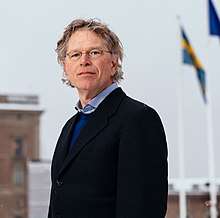Björn-Ola Linnér
Björn-Ola Linnér (born 1963) is a Swedish climate policy scholar and professor at Linköping University. He is program director of Mistra Geopolitics, a research programme that critically examines and explores the interplay between the dynamics of geopolitics, human security, and global environmental change. He is also affiliated at the Institute for Science, Innovation and Society at Oxford University and the Stockholm Environment Institute.
Björn-Ola Linnér | |
|---|---|
 Björn-Ola Linnér outside the Swedish Parliament 2018. Photo by David Brohede. | |
| Born | 1963 Gothenburg, Sweden |
| Academic background | |
| Alma mater | Lund University, Sweden |
| Academic work | |
| Main interests | Climate policy |
Biography
Linnér was born in 1963, Sweden. He received a PhD degree in 1998 on the dissertation The world household: Georg Borgström and the postwar population–resource crisis.,[1] which was later reworked into the book The Return of Malthus: Environmentalism and Postwar Population–Resource Crises, where he analyses neo-Malthusianism in conservationism, environmentalism and in international politics in the 20th century.[2] In 2008, he was appointed professor at the Department of Thematic Studies – Environmental Change at Linköping University.[3]
Linnér is currently program director of Mistra Geopolitics, a research programme that critically examines and explores the interplay between the dynamics of geopolitics, human security, and global environmental change. He is also affiliated as a researcher at the Institute for Science, Innovation and Society at Oxford University and the Stockholm Environment Institute.
Linnér's climate policy research focuses on societal transformations to sustainability,[4][5] linkages between climate and sustainable development policy,[6] international climate governance[7][8][9][10][11] and tools for climate visualization.[12]
He is associate editor of the Oxford research encyclopedia of climate science and editorial board member of the Science in Society series, Sustainability, and Current Sustainable/Renewable Energy Reports.[13]
He is advisor to international organisations, ministries and agencies as well as industry and civil society organisations. He has been scientific expert in the Swedish delegation to negotiations of the Synthesis Report of the Intergovernmental Panel on Climate Change. He held the Research and Independent NGO constituency's address at the High-level segment of UNFCCC Conference (Copenhagen 2009). He is also a member of the Research Council of the Swedish Environmental Protection Agency.
Linnér is frequently engaged in public debate on international climate policy.
Selected bibliography
- Books
- Björn-Ola Linnér, Victoria Wibeck. Sustainability Transformations: Agents and Drivers across Societies (Cambridge University Press; 2019) (ISBN 9781108766975)[14]
- Benjamin Sovacool, Björn-Ola Linnér. The Political Economy of Climate Adaptation (Palgrave Macmillan; 2015)
- Björn-Ola Linnér. The Return of Malthus: Environmentalism and Postwar Population–Resource Crises (Whitehorse Press; 2003)
- Articles
- Christer Karlsson, Charles Parker, Mattias Hjerpe, Björn-Ola Linnér (2011). Looking for leaders: Perceptions of climate change leadership among climate change negotiation participants. Global Environmental Politics 11, 89–107 doi:10.1162/GLEP_a_00044
References
- Linnér, Björn-Ola (1998). The world household: Georg Borgström and the postwar population-resource crisis. Linköping studies in arts and science, 0282-9800 ; 181. Linköping: Tema, Univ. Libris 8372507. ISBN 91-7219-355-7.
- Linnér, Björn-Ola (2003). The Return of Malthus: Environmentalism and Postwar Population–Resource Crises.
- "Professor Björn-Ola Linnér". School of Anthropology & Museum Ethnography. Retrieved 17 March 2020.
- Linnér, B.-O. & Wibeck, V. (2019) Sustainability Transformations: Agents and Drivers across Societies; Cambridge University Press.
- Linnér, Björn-Ola & Wibeck, Victoria (2020), Conceptualising variations in societal transformations towards sustainability, Environmental Science & Policy.106: 221–227.
- Linnér, B-O. and Selin, H. (2013). "The United Nations Conference on Sustainable Development: Forty Years in the Making.”. Environment and Planning. C: Government and Policy 31 (6): sid. 971–987.
- Jernnäs, M & Linnér, B-O. (2019). A Discursive Cartography of Nationally Determined Contributions to theParis Climate Agreement. Global Environmental Change. 55: 73–83.
- Sovacool, B, Linnér, B–O & Klein, RJT (2017). Climate change adaptation and the Least Developed Countries Fund (LDCF): Qualitative insights from policy implementation in the Asia-Pacific. Climatic Change.140, 2:209–226.
- Kuyper, J., Schroeder, H., and Linnér, B-O. (2018). The Evolution of the UNFCCC. Annual Review of Environment and Resources. 43:15.1–15.
- Kuyper, J. W., Linnér, B.-O. & Schroeder, H. (2017), Non-state actors in hybrid global climate governance: justice, legitimacy, and effectiveness in a post-Paris era. WIREs Clim Change, e497. doi:10.1002/wcc.497.
- Bäckstrand, K., Kuyper, J. W., Linnér, B-O. & Lövbrand, E. (2017) Non-state actors in global climate governance: from Copenhagen to Paris and beyond. Environmental Politics 26, 4: 561–579.
- Wibeck, V, Neset, T-S., Linnér, B-O. (2013). ”Communicating climate change through ICT-based visualization: towards an analytical framework”. Sustainability 5: sid. 4760–4777.
- "Björn-Ola Linnér. Staff Tema Environmental change". Linköping University. Retrieved 17 March 2020.
- "Cambridge Core: Sustainability Transformations: Agents and Drivers across Societies". Cambridge University Press. September 2019. Retrieved 14 February 2020.